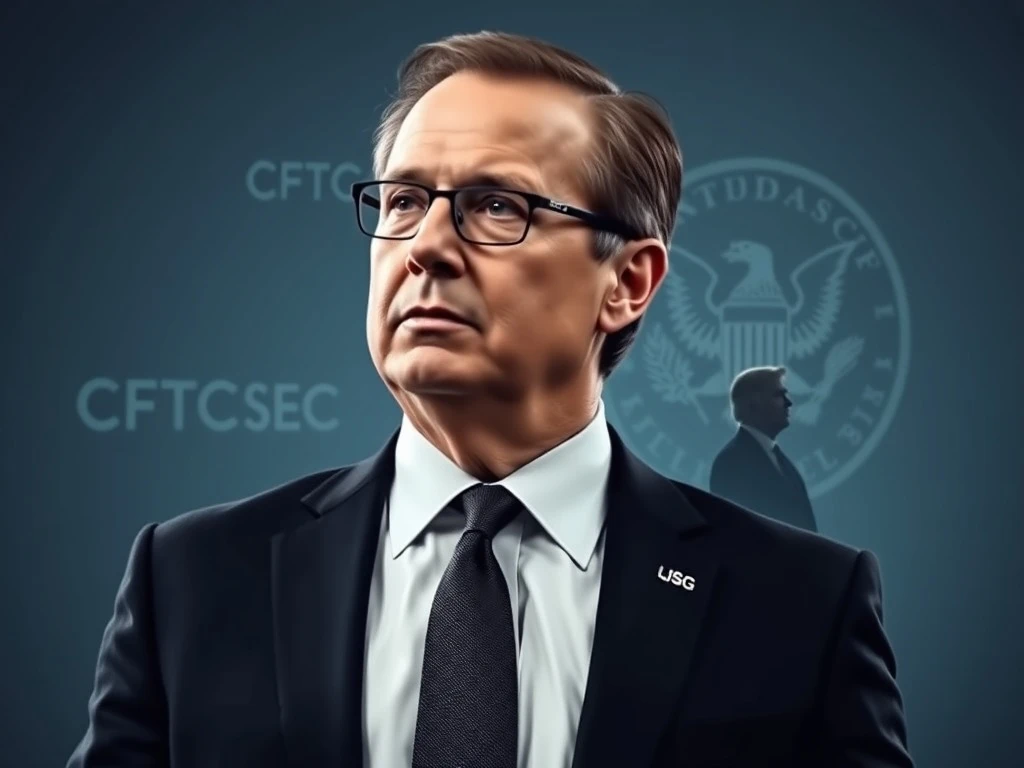Michael Selig: Trump’s Pivotal CFTC Chair Pick Promises New Era for Crypto Regulation

The cryptocurrency world is buzzing with significant news: Michael Selig, a prominent pro-crypto lawyer, has received a crucial nomination from the Trump administration. He is poised to become the next CFTC Chair, a move that could profoundly reshape the landscape of crypto regulation in the United States. This nomination reflects a growing focus on digital assets within political spheres. It signals a potential shift towards a more crypto-friendly regulatory environment. Furthermore, this decision aligns with a broader push to solidify America’s position in the global digital economy.
Michael Selig’s Journey to Digital Asset Oversight
Michael Selig brings a wealth of experience to this critical role. He is a distinguished graduate of George Washington University Law School. Selig began his government career at the CFTC, serving under former Commissioner J. Christopher Giancarlo from 2014 to 2015. This early experience provided him with foundational knowledge of commodity markets. Following his tenure at the CFTC, Selig honed his legal expertise in private practice. He worked as an associate at Cadwalader, Wickersham & Taft, and later at Perkins Coie, where he advanced to counsel.
His career trajectory then led him to Willkie Farr & Gallagher in April 2022, where he became a partner in January 2024. Significantly, Selig recently served as chief counsel to the SEC’s Crypto Task Force and as a senior advisor to the chairman. This role placed him at the forefront of digital asset discussions within the Securities and Exchange Commission. Consequently, he possesses a unique understanding of both traditional finance and the evolving crypto sector. His diverse background positions him as a knowledgeable candidate for enhancing digital asset oversight.
A Pro-Crypto Vision for America’s Financial Future
Selig’s stance on cryptocurrencies is unequivocally pro-innovation. Following his nomination, he shared his optimistic vision on social media. He declared that “a Great Golden Age for America’s Financial Markets and a Wealth of New Opportunities stand before us.” Moreover, he pledged to “help the President make the United States the Crypto Capital of the World.” This ambitious statement clearly outlines his commitment to fostering crypto growth. David Sacks, the White House’s AI and crypto czar, echoed this sentiment. Sacks praised Selig for his passion “about modernizing our regulatory approach.” He believes this modernization is essential “to maintain America’s competitiveness in the digital asset era.”
Sacks also highlighted Selig’s instrumental role in driving the President’s crypto agenda. This was evident during his time as Chief Counsel of the SEC Crypto Task Force. His deep experience in traditional commodities markets, gained at the CFTC, further strengthens his qualifications. Industry observers have noted Selig’s close analysis of significant cases, such as SEC v. Ripple. In 2023, he argued that XRP is “simply computer code” and a “fungible commodity.” This perspective is particularly relevant for future crypto regulation. He contended that the SEC could not credibly argue a substantial penalty against Ripple or the security status of XRP. This approach, favoring a commodity classification for many digital assets, holds significant implications for the industry.
Reshaping Crypto Regulation: CFTC vs. SEC Jurisdictions
The debate over classifying digital assets as commodities or securities remains central to US crypto regulation. Currently, Congress is deliberating the Responsible Financial Innovation Act. This bill, which passed the House of Representatives as the “CLARITY Act,” aims to reclassify many cryptocurrencies as commodities. Should this legislation pass, the primary regulatory authority for a significant number of cryptocurrencies, including Bitcoin (BTC), would shift to the CFTC. The commission already oversees crypto derivatives and holds anti-fraud authority over the industry’s spot market. This legislative shift would empower the CFTC significantly.
The nomination of Michael Selig as CFTC Chair aligns perfectly with this potential rebalancing of power. However, legislative progress faces considerable hurdles. A government shutdown and increasing bipartisanship have significantly stalled the bill’s advancement. Senator Tim Scott’s hoped-for September deadline passed without resolution. Despite these challenges, the SEC and CFTC have initiated efforts to align their regulatory approaches. SEC Chairman Paul Atkins announced a roundtable with the CFTC to foster collaboration. Acting CFTC Chair Caroline Pham acknowledged past competition between the agencies. She stated, “It is not what we want. And it’s not the best way to serve the American people who rely on us.” Pham confirmed that both agencies are making joint recommendations to the administration’s Working Group on Digital Asset Markets. These efforts aim to foster innovation, clarify jurisdictional ambiguities, and enhance market access for investors.
Navigating Legislative Hurdles and Trump Crypto Policy
The effectiveness of these collaborative efforts remains limited by ongoing political gridlock. A protracted government shutdown severely impacts federal agencies. Former CFTC Chair Giancarlo highlighted the difficulties for the CFTC to implement new rulemaking without a full commission or adequate staff. Federal agencies operate with skeleton crews during shutdowns. This hampers not only the CFTC and SEC’s ability to enact new rules but also the latter’s capacity to consider crypto exchange-traded fund listings. The lack of a stable budget and continued partisan sparring create an uncertain environment for regulatory progress. Therefore, the successful implementation of any new Trump crypto policy hinges on resolving these broader political issues.
The appointment of Michael Selig as CFTC Chair is a crucial step towards clearer digital asset oversight. Yet, his ability to enact change depends on congressional action and political consensus. The crypto industry, including influential figures like Cameron and Tyler Winklevoss, closely watches these developments. Their approval, alongside Senate confirmation, is vital. The path forward for US crypto regulation is complex. However, Selig’s nomination injects renewed optimism for a more defined and supportive regulatory framework for digital assets.







